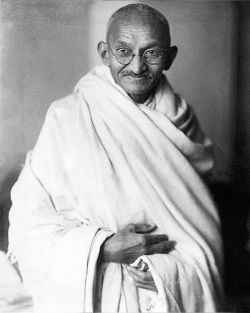Mahatma Gandhi: Difference between revisions
No edit summary |
m Removed protection from "Mahatma Gandhi" |
||
| (5 intermediate revisions by the same user not shown) | |||
| Line 1: | Line 1: | ||
{{#seo: | {{#seo: | ||
|title=Mahatma Gandhi – Father of the | |title=Mahatma Gandhi Biography – Father of the Nation & Leader of India’s Freedom Struggle | ||
|description=Mahatma Gandhi was | |description=Mahatma Gandhi was the leader of India’s independence movement against British rule, known for his philosophy of non-violence (Ahimsa) and truth (Satyagraha). | ||
|image=Mahatma Gandhi.jpg | |keywords=Mahatma Gandhi Biography, Father of the Nation, Indian freedom struggle, non-violence, Satyagraha, Quit India Movement, Gandhi biography, Indian independence, Bapu | ||
| | |image=https://knowlepedia.org/images/Mahatma Gandhi.jpg | ||
}} | |og:type=article | ||
|og:title=Mahatma Gandhi – Icon of Peace & India’s Independence Leader | |||
{{Infobox deceased | |og:description=Explore the life and legacy of Mahatma Gandhi, the Father of the Nation, who led India’s freedom struggle through non-violence and truth. | ||
| name = Mohandas Karamchand Gandhi | |og:image=https://knowlepedia.org/images/Mahatma Gandhi.jpg | ||
|twitter:card=summary_large_image | |||
}} {{Infobox deceased | |||
| name = Mohandas Karamchand Gandhi {{Verified}} | |||
| image = Mahatma Gandhi.jpg | | image = Mahatma Gandhi.jpg | ||
| image_caption = Mahatma Gandhi in 1947 | | image_caption = Mahatma Gandhi in 1947 | ||
| Line 24: | Line 27: | ||
| children = Harilal, Manilal, Ramdas, Devdas | | children = Harilal, Manilal, Ramdas, Devdas | ||
| parents = Karamchand Gandhi (father), Putlibai Gandhi (mother) | | parents = Karamchand Gandhi (father), Putlibai Gandhi (mother) | ||
| religion = Hinduism | | religion = [[Hinduism]] | ||
| website = [https://gandhi.gov.in Official Government Portal] | | website = [https://gandhi.gov.in Official Government Portal] | ||
}} | }}'''Mahatma Gandhi''' (2 October 1869 – 30 January 1948), born as '''Mohandas Karamchand Gandhi''', was an Indian lawyer, anti-colonial nationalist, and political ethicist who led the campaign for India's independence from British rule using nonviolent resistance known as '''Satyagraha'''. | ||
'''Mahatma Gandhi''' (2 October 1869 – 30 January 1948), born as '''Mohandas Karamchand Gandhi''', was an Indian lawyer, anti-colonial nationalist, and political ethicist who led the campaign for India's independence from British rule using nonviolent resistance known as '''Satyagraha'''. | |||
== Early Life == | == Early Life == | ||
Gandhi was born in | Gandhi was born in Porbandar, Gujarat, in a Hindu Modh Bania family. He studied law at the Inner Temple in London and was called to the bar in 1891.In 1893, he moved to South Africa where he spent 21 years fighting racial injustice. | ||
== Political Career == | == Political Career == | ||
| Line 37: | Line 38: | ||
* '''Non-Cooperation Movement''' (1920–22) | * '''Non-Cooperation Movement''' (1920–22) | ||
* '''Salt Satyagraha''' or Dandi March (1930) | * '''Salt Satyagraha''' or Dandi March (1930) | ||
* '''Quit India Movement''' (1942) | * '''Quit India Movement''' (1942) | ||
His philosophy of peaceful resistance inspired movements worldwide, including those by | His philosophy of peaceful resistance inspired movements worldwide, including those by Martin Luther King Jr. and Nelson Mandela. | ||
== Philosophy == | == Philosophy == | ||
| Line 51: | Line 52: | ||
== Assassination == | == Assassination == | ||
On 30 January 1948, Gandhi was assassinated in [[New Delhi]] by Nathuram Godse, a Hindu nationalist opposed to his inclusive policies. | On 30 January 1948, Gandhi was assassinated in [[New Delhi]] by Nathuram Godse, a Hindu nationalist opposed to his inclusive policies. His death was mourned globally. | ||
== Legacy == | == Legacy == | ||
* Honored as the | * Honored as the '''Father of the Nation''' in India | ||
* 2 October is observed as '''Gandhi Jayanti''' and the '''International Day of Non-Violence''' | * 2 October is observed as '''Gandhi Jayanti''' and the '''International Day of Non-Violence''' | ||
* Subject of countless biographies and films, notably *''Gandhi''* (1982) | * Subject of countless biographies and films, notably *''Gandhi''* (1982) | ||
== Notable Works == | == Notable Works == | ||
* '' | * ''Hind Swaraj'' (1909) | ||
* '' | * ''The Story of My Experiments with Truth'' – Autobiography | ||
* Salt March (1930) | * Salt March (1930) | ||
* Quit India Speech (1942) | * Quit India Speech (1942) | ||
== Awards and Honors == | == Awards and Honors == | ||
* **Time Magazine’s Man of the Year (1930)** | * **Time Magazine’s Man of the Year (1930)** | ||
* Streets, universities, and statues dedicated in his honor globally | * Streets, universities, and statues dedicated in his honor globally | ||
* Revered for his philosophy of non-violence and justice | * Revered for his philosophy of non-violence and justice | ||
| Line 71: | Line 72: | ||
== See Also == | == See Also == | ||
* [[Indian Independence Movement]] | * [[Indian Independence Movement]] | ||
* | * Satyagraha | ||
* | * Kasturba Gandhi | ||
* | * Raj Ghat | ||
== References == | == References == | ||
<references/> | <references/> | ||
[[Category:Articles needing expansion]] | |||
[[Category:Articles needing more references]] | |||
[[Category:1869 births]] | |||
[[Category:1948 deaths]] | |||
[[Category:Indian lawyers]] | |||
[[Category:Indian politicians]] | |||
[[Category:Indian writers]] | |||
[[Category:Indian philosophers]] | |||
[[Category:People from Gujarat]] | |||
[[Category:Indian social reformers]] | |||
[[Category:Leaders of the Indian independence movement]] | |||
Latest revision as of 17:40, 25 August 2025
| Mohandas Karamchand Gandhi | |
|---|---|

| |
| Mahatma Gandhi in 1947 | |
| Born | 02 October 1869 |
| Birthplace | Porbandar, Gujarat, British India |
| Died | 30 January 1948 (aged 78) |
| Place of death | New Delhi, India |
| Resting place | Raj Ghat, New Delhi |
| Nationality | Indian |
| Occupation | Lawyer, Freedom Activist, Political Leader, Social Reformer |
| Years active | 1893–1948 |
| Known for | Indian Independence Movement, Satyagraha, Non-violent resistance |
| Notable works | Hind Swaraj, The Story of My Experiments with Truth, Salt March, Quit India Movement |
| Awards | Time Person of the Year (1930); Global tributes including statues, memorials, and a national holiday (Gandhi Jayanti) |
| Spouse(s) | Kasturba Gandhi |
| Children | Harilal, Manilal, Ramdas, Devdas |
| Parents | Karamchand Gandhi (father), Putlibai Gandhi (mother) |
| Religion | Hinduism |
| Website | Official Government Portal |
Mahatma Gandhi (2 October 1869 – 30 January 1948), born as Mohandas Karamchand Gandhi, was an Indian lawyer, anti-colonial nationalist, and political ethicist who led the campaign for India's independence from British rule using nonviolent resistance known as Satyagraha.
Early Life
Gandhi was born in Porbandar, Gujarat, in a Hindu Modh Bania family. He studied law at the Inner Temple in London and was called to the bar in 1891.In 1893, he moved to South Africa where he spent 21 years fighting racial injustice.
Political Career
In 1915, Gandhi returned to India and quickly became a key figure in the Indian Independence Movement. He launched several major movements:
- Non-Cooperation Movement (1920–22)
- Salt Satyagraha or Dandi March (1930)
- Quit India Movement (1942)
His philosophy of peaceful resistance inspired movements worldwide, including those by Martin Luther King Jr. and Nelson Mandela.
Philosophy
Gandhi’s ideology included:
- Ahimsa – Non-violence in thought and action
- Satyagraha – Truth-force or soul-force
- Swadeshi – Use of indigenous goods
- Sarvodaya – Upliftment of all
Assassination
On 30 January 1948, Gandhi was assassinated in New Delhi by Nathuram Godse, a Hindu nationalist opposed to his inclusive policies. His death was mourned globally.
Legacy
- Honored as the Father of the Nation in India
- 2 October is observed as Gandhi Jayanti and the International Day of Non-Violence
- Subject of countless biographies and films, notably *Gandhi* (1982)
Notable Works
- Hind Swaraj (1909)
- The Story of My Experiments with Truth – Autobiography
- Salt March (1930)
- Quit India Speech (1942)
Awards and Honors
- **Time Magazine’s Man of the Year (1930)**
- Streets, universities, and statues dedicated in his honor globally
- Revered for his philosophy of non-violence and justice
See Also
- Indian Independence Movement
- Satyagraha
- Kasturba Gandhi
- Raj Ghat

